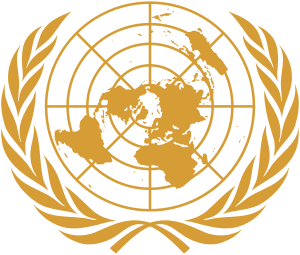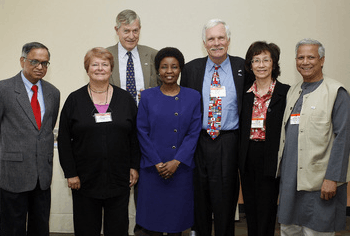United Nations Office for Partnerships
| UN Office for Partnerships | |
 | |
| Abbreviation | UNOP, UNFIP, UNDEF |
|---|---|
| Formation | March 1998 |
| Type | Partnerships |
| Legal status | Active |
Head | Annika Savill(Acting) Executive Director |
Parent organization | UN Secretariat |
| Website | http://www.un.org/partnerships |
The United Nations Office for Partnerships (UNOP) serves as a gateway for partnership opportunities with the United Nations. It promotes new collaborations and alliances that help fulfill the Millennium Development Goals (MDGs) and provides support to new initiatives of the Secretary-General. UNOP provides partnership advisory services and outreach to a variety of entities, as well as managing the United Nations Fund for International Partnerships (UNFIP), established by the Secretary-General in March 1998 to serve as the interface in the partnership between the UN system and the UN Foundation, and the United Nations Democracy Fund (UNDEF), established by the Secretary-General in July 2005 to support democratization throughout the world. The Office, headed by Amir Dossal, reports to the Secretary-General, Ban Ki-moon.
UN Fund for International Partnerships (UNFIP)

The United Nations Fund for International Partnerships (UNFIP) was established by then-Secretary-General Kofi Annan in March 1998 to serve as the interface for the partnership between the United Nations system and the United Nations Foundation—the public charity responsible for administering Ted Turner's $1 billion contribution in support of UN causes.
UNFIP is responsible for administering and developing partnerships between the agencies, departments, and programmes of the United Nations and the private sector. UNFIP works with foundations and corporations that wish to support UN causes to identify opportunities for partnership and collaboration. In particular, UNFIP facilitates the UN's work with the United Nations Foundation, which Ted Turner established to donate $1 billion to the UN over the course of 15 years, though UNFIP has also worked closely with the Bill & Melinda Gates Foundation, the Ford Foundation, the Rockefeller Foundation, the Synergos Institute, and the LTB Foundation, among others. UNFIP has entered into partnerships with companies such as Google, Microsoft, and Ericsson. The partnerships developed and managed by UNFIP all work towards achieving the Millennium Development Goals.
UNFIP priorities
Funds mobilized by the UN Foundation are channelled, through UNFIP into the UN system, for implementation of projects to achieve the Millennium Development Goals through investments in:
- Global Health with an emphasis on children's health
- Population and women
- Sustainable energy and climate change
- Post-2015 development agenda
Since 1998, the UN Foundation has contributed a total of $1.028 billion in grants to the United Nations through UNFIP. The contributions have been provided to fund 413 projects in 123 countries implemented by 39 UN agencies. The UN Foundation is working to leverage another $1 billion for UN causes within the next few years.[1]
UN Democracy Fund (UNDEF)
The United Nations Democracy Fund (UNDEF), established by then-Secretary-General Kofi Annan in July 2005, supports democratization throughout the world by focusing on democratic institutions, promoting human rights, and ensuring the participation of all groups in democratic processes. UNDEF provides assistance to governmental, non-governmental, national, regional, and international organizations, including relevant UN departments, offices, funds, programmes, and agencies.
UNDEF Priorities
- Strengthening democratic dialogue and support for constitutional processes
- Civil society empowerment
- Civic education, voter registration, and strengthening of political parties
- Citizen’s access to information
- Human rights and fundamental freedoms
- Accountability, transparency, and integrity
As of June 2009, the Democracy Fund had received over US$96 million in pledges or contributions from 36 member states.[2]
UNDEF launched the second round of project applications from November to December 2008 and received over 1,800 applications. In early 2008, UNDEF conducted assessments of these projects with a team of assessors using a score scale, which resulted in a short list of 360 projects. The Programme Consultative Group (PCG) members consist of the UN Development Fund for Women (UNIFEM), the UN Department of Peacekeeping Operations (DPKO), the Office of the UN High Commissioner of Human Rights (OHCHR), the UN Office on Drugs and Crime (UNODC), the UN Development Programme (UNDP), and the UN Department of Political Affairs (UNDPA) (with the Peacebuilding commission as an observer).
UN Resident Coordinators participate in a quality control process of reviewing projects and produce a list of 86 projects totaling a project cost of about $25 million. UNDEF held its 7th Advisory Board meeting with the Secretary-General on 28 March 2008. In May, all 86 projects were approved by the Secretary-General and in June 2008, UNDEF forwarded letters to all Permanent Representatives informing them of projects which will take place in their countries. In parallel to this effort, UNDEF initiated negotiation of project documents with implementing agencies of 86 projects. Upon approval by the UN Controller’s Office, UNDEF will initiate disbursements of grants in July and August 2008.[3]
Partnership Advisory Services and Outreach
UNOP also provides Partnership Advisory services and outreach to a variety of entities, including academic institutions, companies, foundations, government agencies, and civil society organizations. UNOP encourages investment in high-impact initiatives by advising on UN procedures and best practices; assisting in the design of programmes and projects; helping establish and, in some cases, manage global and regional networks; and advocating use of the MDGs as a framework for action.
Outreach
UNOP has worked in close collaboration with the United Nations Foundation to further promote and implement partnership advisory services and outreach initiatives, and foster innovative strategies for engaging non-state actors with the UN System. The Office has also brokered and coordinated strategies to strengthen the Organization's expertise and capacity to engage corporations, foundations, and individuals in UN causes and to support the United Nations system in its advocacy and outreach efforts through partnership building.
In the last decade the number of private-sector entities who approached the UN seeking advice on how to engage and provide assistance has increased significantly. Companies of various sizes that produce a wide spectrum of goods and services have approached the UNOP offering their help or seeking advice on how to collaborate with the UN on finding sustainable solutions to some of the world's most challenging problems.
Although most of the private-sector companies and foundations interested in increased engagement with the UN system are based in developed countries, those with origins in developing countries has been increasing steadily. The Office has received strong interest in partnering in UN-led poverty reduction, disaster prevention, education, health, and environmental programmes, as well as disaster relief and humanitarian assistance, in the least-developed countries.
See also
References and notes
- ↑ http://www.un.org/partnerships/YFCThematic.htm
- ↑ "Financial Contributions Archived August 11, 2009, at the Wayback Machine." United Nations.
- ↑ "Archived copy". Archived from the original on August 6, 2009. Retrieved January 26, 2010.
External links
- United Nations
- UN Office of Partnerships
- UN Democracy Fund
- UN Foundation
- MDG Monitor - Tracking the Millennium Development Goals